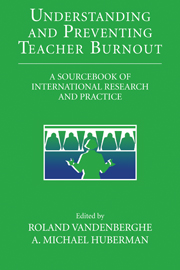Book contents
- Frontmatter
- Contents
- Contributors
- List of Figures
- List of Tables
- Foreword
- Introduction: Burnout and the Teaching Profession
- PART ONE TEACHER BURNOUT: A CRITICAL REVIEW AND SYNTHESIS
- PART TWO TEACHER BURNOUT: PERSPECTIVES AND REMEDIES
- 7 Inconsequentiality – The Key to Understanding Teacher Burnout
- 8 Turning Our Schools into a Healthier Workplace: Bridging Between Professional Self-Efficacy and Professional Demands
- 9 Teaching Career: Between Burnout and Fading Away? Reflections from a Narrative and Biographical Perspective
- 10 A Psychosocial Interpretation of Teacher Stress and Burnout
- 11 Burnout Among Teachers as a Crisis in Psychological Contracts
- 12 Progress in Understanding Teacher Burnout
- 13 Teachers' Moral Purpose: Stress, Vulnerability, and Strength
- 14 Teacher Burnout from a Social-Cognitive Perspective: A Theoretical Position Paper
- 15 Professional Identity, School Reform, and Burnout: Some Reflections on Teacher Burnout
- 16 Conflicting Mindscapes and the Inevitability of Stress in Teaching
- 17 Do Teachers Burn Out More Easily? A Comparison of Teachers with Other Social Professions on Work Stress and Burnout Symptoms
- 18 Teacher Burnout
- PART THREE TEACHER BURNOUT: A RESEARCH AND INTERVENTION AGENDA
- References
- Index
9 - Teaching Career: Between Burnout and Fading Away? Reflections from a Narrative and Biographical Perspective
Published online by Cambridge University Press: 06 January 2010
- Frontmatter
- Contents
- Contributors
- List of Figures
- List of Tables
- Foreword
- Introduction: Burnout and the Teaching Profession
- PART ONE TEACHER BURNOUT: A CRITICAL REVIEW AND SYNTHESIS
- PART TWO TEACHER BURNOUT: PERSPECTIVES AND REMEDIES
- 7 Inconsequentiality – The Key to Understanding Teacher Burnout
- 8 Turning Our Schools into a Healthier Workplace: Bridging Between Professional Self-Efficacy and Professional Demands
- 9 Teaching Career: Between Burnout and Fading Away? Reflections from a Narrative and Biographical Perspective
- 10 A Psychosocial Interpretation of Teacher Stress and Burnout
- 11 Burnout Among Teachers as a Crisis in Psychological Contracts
- 12 Progress in Understanding Teacher Burnout
- 13 Teachers' Moral Purpose: Stress, Vulnerability, and Strength
- 14 Teacher Burnout from a Social-Cognitive Perspective: A Theoretical Position Paper
- 15 Professional Identity, School Reform, and Burnout: Some Reflections on Teacher Burnout
- 16 Conflicting Mindscapes and the Inevitability of Stress in Teaching
- 17 Do Teachers Burn Out More Easily? A Comparison of Teachers with Other Social Professions on Work Stress and Burnout Symptoms
- 18 Teacher Burnout
- PART THREE TEACHER BURNOUT: A RESEARCH AND INTERVENTION AGENDA
- References
- Index
Summary
In this chapter, I look at teacher stress and burnout through the lens of my narrative-biographical research on teacher development (Kelchtermans, 1993a; 1993b). In their retrospective narrative accounts of career experiences, teachers often mention periods of strain, disturbing events, or frustrating situations with stressful effects. I use “stress” in a broad sense, referring to all these aspects of the teaching job that are experienced by teachers as frustrating, dissatisfying, or demotivating. Although I realize that some “stress” might operate positively (e.g., as an extra stimulant to reconsider and eventually change one's teaching practice), my use of the term in this chapter always implies the negative connotation of the word. “Burnout” is seen here as an advanced position on the stress continuum, showing the three facets distinguished by Maslach and Jackson: emotional exhaustion, depersonalization, and reduced personal accomplishment (Maslach and Jackson, 1984; see also Byrne and Maslach, this volume). In the discussion about the strict conceptual definition of stress and burnout, this is a pragmatic stance, one that focuses on the subjective meaning of these phenomena: the way they are “lived” by the teachers themselves.
This chapter thus has its theoretical roots in the phenomenological and symbolic interactionist tradition (e.g., Blumer, 1969). Stressful events are situations that are subjectively experienced by the teachers as negatively affecting their self-perception and their professional performance.
- Type
- Chapter
- Information
- Understanding and Preventing Teacher BurnoutA Sourcebook of International Research and Practice, pp. 176 - 191Publisher: Cambridge University PressPrint publication year: 1999
- 23
- Cited by



